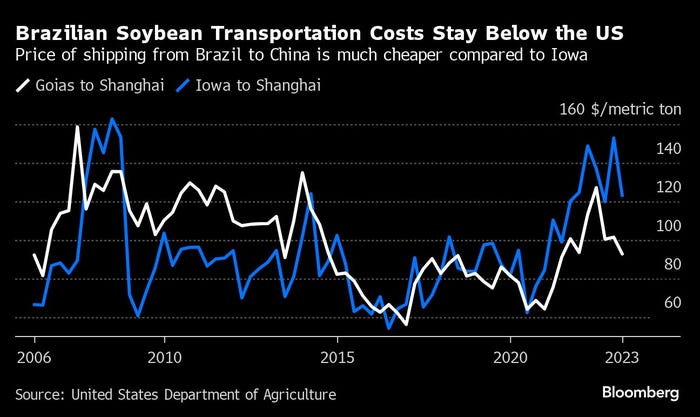Is China avoiding U.S. commodities as a political stunt?
Agriculture Secretary Tom Vilsack implied that China may be favoring Brazilian corn and soybeans in retaliation.
April 10, 2024

By Michael Hirtzer and Kim Chipman
U.S. Agriculture Secretary Tom Vilsack implied that China may be favoring Brazilian corn and soybeans partly in retaliation against recent restrictions on ownership of American farmland.
Vilsack said his counterpart in China recently brought up Arkansas’ move to force seed company Syngenta AG, which is controlled by China’s Sinochem Holdings Corp., to sell 160 acres of farmland in the state.
The action — the first enforcement taken under legislation signed into law by Republican governor Sarah Huckabee Sanders that bans prohibited foreign entities from owning Arkansas farmland — is part of the constant “ripping” of China that has prompted it to spurn U.S. agriculture products, Vilsack said.
“We had a trade deficit of $6 billion in the first quarter of this fiscal year; China’s purchases are $6 billion less than they were a year ago,” Vilsack said in an interview Tuesday. “Why would that be? Is it just Brazil, or was there a reason why the Chinese ag minister asked me about Syngenta?”
Why was it brought up, Vilsack asked: “It was a signal.”

An email sent to the Chinese embassy in Washington on Tuesday wasn’t immediately answered. China’s Ministry of Commerce and Ministry of Agriculture and Rural Affairs didn’t immediately respond to requests for comment.
Vilsack said the U.S. needs to diversify by working more with other countries in Asia, Africa and Latin America. Still, he said the U.S. would like to be able to continue doing business with China.
“What we have to have I think in this country is a bit more nuanced conversation about China, and a bit more complex conversation about China,” he said. “At the same time, we need to diversify away from over-reliance on China.”
With China buying fewer crops from the U.S., Brazil has overtaken America as the world’s top corn shipper after already doing so with soybeans.
© 2024 Bloomberg L.P.
You May Also Like



